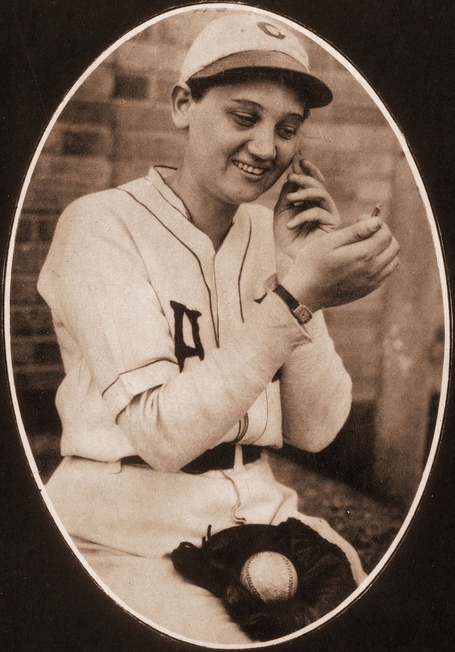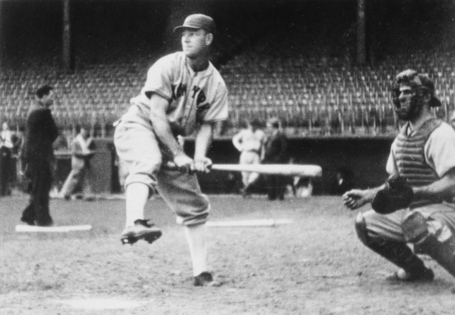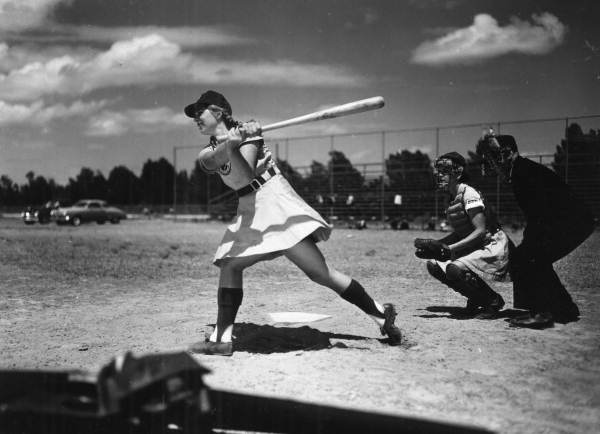
Someday, MLB Mother's Day will be about not just pink bats, but a player -- but will we be ready as a society to embrace the moment when it comes?
Baseball has not experienced its last Jackie Robinson moment. The arrival of the first openly gay player is an obvious possibility, and there are many countries that have yet to send a player to the bigs. It would be fascinating to see a star emerge from, say, a troubled state like the Democratic Republic of the Congo (the former Zaire). That country that surely has more important problems to solve than producing major-league-quality baseball players, but you'd have to think it would do a chaotic and uncertain country some good to share a national symbol of possibility.
Then there is the first woman to play Major League Baseball, the person who will integrate our current teams on a gender basis. I had a long-running, friendly argument with a colleague in the scouting business about whether a woman would be physically capable of making the grade. His position was that no female had the necessary upper-body strength to hit big league pitching or to pitch with enough stuff (or even guile) to retire big league hitters consistently.
My contention was that "she," whoever she was, was probably out there already, and that she simply lacked an avenue to develop. As Babe Ruth said in his goodbye to baseball (and to life), "Some people think if you give [boys] a football or a baseball ... naturally they're athletes right away, but you can't do that in baseball. You've got to start from way down the bottom when you're six or seven years of age. You can't wait until you're 15 or 16. You've got to let it grow up with you."
Lacking that -- and though some girls do play Little League, they're generally channeled into softball once they age out -- it won't happen. One of the only serious attempts at fielding a women's professional team since World War II, the Colorado Silver Bullets of 1994-1997, a team that barnstormed against male competition, all but eliminated itself in terms of developing true prospects by requiring that players be of legal drinking age; the Coors Brewing Company, the team's sponsor, demanded it. Other top female players were more interested in the 1996 Olympics. Too late, sayeth the Babe, too late. The Silver Bullets did not play well, and with no hope of developing young players, they had no chance at improvement.
Nevertheless, it's not difficult to look at the games women do play and see that there are female athletes with the strength, speed, and reflexes to make the dream of a mixed-gender major leagues at least a possibility. I'm not suggesting that it's common for women to have the upper-body strength to be true sluggers, but it's not common for anyone to have that sort of strength, and baseball has always been amenable to many different styles of play. There have been good hitters who were small of stature but generated power through having unusually strong wrists, an exaggerated weight transfer, or a high leg-kick. And power, of course, isn't the only successful way of hitting. Ichiro Suzuki made himself a Hall of Famer beating out 6-3 grounders, and many greats simply sprayed the ball from line to line and took a few walks. That approach fell out of style in recent decades as hitting home runs became easier and easier, but lower offensive levels and the new prevalence of the shift is just begging for it to make a comeback.
There have been 163 players between 5'6 and 5'11 to play in the majors this year, and 15 players under 170 pounds. According to a random web site I just checked -- it's the government's, so it's probably correct -- the current average height for a woman 20 years of age or older is around 5'4, with a weight of 166 pounds. That's an average, with all the usual caveats that apply to numbers like this; there's a high end and a low end. As such, it's not hard to imagine there are a number of female athletes with more imposing forms than, say, Jose Altuve's.
More tellingly, we've seen female players such as Julie Croteau in the 1980s and Ila Borders in the 1990s play with at least some success on men's college teams. More recently, Japanese knuckleballer Eri Yoshida has pitched professionally both here and in Japan. A woman playing major-league ball is perhaps unlikely, but far from impossible. It's hard to know what's possible until it announces itself. From there, it's generally a short trip.
★★★
The arrival of a female major leaguer is a harmless thing to contemplate and look forward to with pleasure, but it's by no means certain that our culture is ready for it. For all the adulation and attention this pioneering woman would generate, for all the bumps in attendance and television ratings, it will not at all be easy for her. She will be harassed, subject to the vilest comments and threats. When the Silver Bullets began playing, one of their first opponents was heard saying, "Check out the third baseman... Sweeeet. I never thought I'd want to kiss a third baseman." That was 20 years ago; today, less famous women already deal with the same and worse every day.
Inevitably, some of the hostility and sexism will come from within the major leagues. Just as the Ben Chapmans of the world awaited Jackie Robinson's ascension to the big leagues, just as players and managers fought to keep women journalists out of the clubhouse into the 1980s (Commissioner Bowie Kuhn reluctantly ordered they be permitted in 1979 after losing a lawsuit brought by Sports Illustrated, but that didn't end the hostility), there will be players who go out of their way to make things harder.
All American Girls Professional Baseball League member Dottie Schroeder getting a hit, Opa-locka, Florida (1948) (State Archives of Florida, Florida Memory)
It was a long time ago now, 1988, that Astros lefty Bob Knepper said, speaking of female umpire Pam Postema, "There are certain things a woman shouldn't be... It's a physical thing. God created women to be feminine. I don't think they should be competing with men. It has nothing to do with her ability. I don't think women should be in any position of leadership. I don't think they should be presidents or politicians. I think women were created not in an inferior position, but in a role of submission to men. You can be a woman umpire if you want, but that doesn't mean it's right. You can be a homosexual if you want, but that doesn't mean that's right either."
It's easy to imagine that there are still players who share those kinds of beliefs, just as there are no doubt men and women outside the game who still do, or believe that African Americans would be better off as slaves, or any number of obviously stupid and inherently un-American things. Even if those delightful folks stay under their rocks, our notional female big leaguer will be subject to a running argument about if she's truly capable or just a gimmick. She'll have to be really good. Hell, to overcome the inevitable skepticism she will have to be great.
Consider how stupidly reactionary many observers are about baseball's male players -- recall, for instance, the idiotic issues surrounding Mets second baseman Daniel Murphy taking paternity leave -- and then imagine how absurdly condemnatory they would feel free to be if a female star or even role player became pregnant. One can only imagine what the misogynists would say then about her team spirit, priorities, and the general appropriateness of women in a men's game, particularly if her team slipped in the standings due to having had to play Eduardo Nunez in her place.
Even this hypothetical discussion presupposes a woman could play baseball, largely a non-contact sport, safely and effectively through about four months of a perfectly-timed pregnancy so as not to miss a full season. What if she collides with an outfielder or catcher or dives for a ball? A different kind of critic emerges, scourging her for risking her health and that of her unborn child for a game. Just imagining the talk radio lines -- "Her hormones are all messed up so she's not giving a full effort" or "She's slumping because she's exhausted nursing that thing" -- is exhausting, and maddening.
We've seen this to some degree in the WNBA, where stars such as Sheryl Swoopes and Candace Parker had midcareer pregnancies. In both cases, the world didn't come to an end, though the New York Times noted that the "W.N.B.A. is not roundly thrilled with [Parker's] pregnancy... She was being counted on to nurture women's basketball [as] the face of the league's marketing campaign." Apparently, though, the league did come around:
W.N.B.A. Commissioner Donna Orender said her initial reaction to Parker's pregnancy was a quiet sigh of resignation. Then she thought of all the women in the more traditional workplace struggling with the issue of when or if to start a family, and she realized that Parker's pregnancy provided a perfect modeling moment.
"Here she is, front and center, and people are discussing the timing of her reproductive life," Orender said Friday in a telephone interview. "That's a very public discussion that hasn't happened before. I do think that's a good thing for women who go through these issues often in silence or alone."
She added, "Candace can be a very usable symbol of how you can have a family and a career."
But baseball fans are, by and large, not interested in usable symbols. They're interested in winning. And if the hubbub surrounding the issue of pregnant athletes in the WNBA or NCAA sports (for the latter, see the Atlantic article linked above, as well as this ESPN report that preceded it) has been relatively limited, it is because these games have a far smaller footprint in American culture than does baseball. If a woman ever does crack the major-league gender line, the attention will be beyond anything we've seen since the days of Jackie Robinson -- and for all the progress we've made, Robinson dealt with a much smaller and slower media than the one we have today.
There is hope that a female baseball player would be safe to be a woman in all senses of the word without being stigmatized. The Atlantic notes that London Olympics volleyball gold medalist Kerri Walsh Jennings was five weeks pregnant at the games, and she wasn't alone: there was also "Malaysian markswoman Nur Suryani Mohd Taibi (seven months pregnant), and field hockey striker Keli Smith (Post-Partum Year One)." These women do not seem to have suffered for being both athletes and mothers. And yet, they too do not play in an arena that looms as large for Americans as does baseball
![]() Must Reads
Must Reads ![]()
![]() Must Reads
Must Reads ![]()
And so I remain skeptical that we will react to her with fairness, justice, and respect. Just as the confluence of the election of an African-American president and the anonymity of the internet has served to uncork both coded and overt expressions of racial prejudice that haven't been socially acceptable since the 1950s, a woman playing baseball would be subject to chauvinistic, misogynistic language that should have died with the first bloom of feminism, if not before. In short, whoever the female Jackie Robinson is, we wouldn't deserve her. At best, it's hard to feel as if we're ready for her yet.
Someday, though, perhaps Mother's Day observance in baseball will be about more than pink bats and breast-cancer awareness (an important thing though that is). It will have this pioneering woman's name attached to it, as Jackie Robinson's name is attached to his special day.
The history of baseball is one of reactionary forces being gradually overcome by an ever more egalitarian, inclusive, and meritocratic system of opportunity. The game went from all white to including really-they're-just-tan-white-guys Cubans (wink-wink) to one African-American, to functioning with an unstated quota of African Americans, to fielding full lineups of African-Americans if that was the best talent you had (it took over 24 years) to including all members of every race and nationality that can play the game at a high level. There should be room in it for all genders as well.
Maybe she's out there right now, still growing up, perhaps a baby or playing Little League somewhere. So happy Mother's Day to you, young Emily, Chloe, Michiko, Danielle, or whatever your name is. This day belongs to you. You just don't know it yet.




